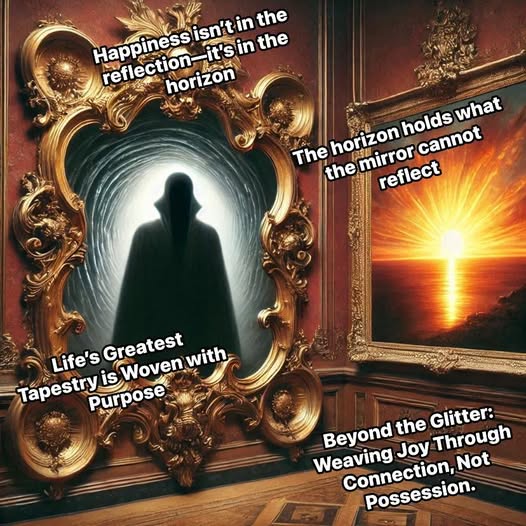
In a bustling city teeming with dazzling lights and towering skyscrapers, there lived a man named Ahmad. He owned a vast collection of treasures—gleaming cars, ornate jewelry, and sprawling mansions. Yet, despite his wealth, Ahmad often found himself staring into his ornate gold-framed mirror, feeling an unspoken emptiness gnawing at his soul. The mirror, polished to perfection, reflected not just his appearance but the hollow echo of his unfulfilled heart.
One day, Ahmad encountered an elderly wanderer named Samar, who carried nothing but a tattered satchel and a serene smile. Intrigued by the old man’s peaceful demeanor, Ahmad invited him into his lavish home. Samar gazed around at the shimmering chandeliers and priceless artifacts, but his eyes held no envy—only a quiet understanding.
“Why do you look so content with so little?” Ahmad asked, unable to conceal his curiosity.
Samar chuckled softly and replied, “Because I’ve learned to gaze beyond the mirror and towards the horizon.”
Confused, Ahmad pressed further. “What do you mean?”
Samar gestured to the ornate mirror on the wall. “That mirror,” he explained, “traps you in a loop. It reflects only what you already have, locking you within the confines of your possessions. You seek happiness there, but it eludes you because the mirror shows only what is finite. Look instead to the horizon, where the sky meets the earth—it holds infinite possibilities.”
Ahmad pondered these words but dismissed them. The next morning, he awoke to find Samar gone, leaving behind a single note: “Gratitude turns what you have into enough, and what others have into beauty.”
Perplexed yet intrigued, Ahmad decided to test the note’s wisdom. That evening, instead of polishing his trophies or admiring his possessions, he ventured out to the city’s edge. There, he found a small village where children played with sticks, their laughter echoing like music. He saw an elderly couple sharing a simple meal, their faces glowing with contentment.
As Ahmad observed, he felt something shift within him. These people had little by material standards, yet they seemed infinitely richer than he ever felt. He saw, for the first time, not what they owned, but the divine essence in their joy, their gratitude, their connection with one another.
In that moment, Ahmad realized that true fulfillment didn’t come from acquiring more but from dissolving the barriers that materialism had built around his soul. His treasures were weights, anchoring him to the finite; the horizon, however, called him toward boundless existence.
Ahmad returned home and did something he’d never imagined—he removed the mirror from his wall. In its place, he hung a simple painting of a sunrise over an endless horizon, a daily reminder of Samar’s words. Slowly, Ahmad began letting go of his need for possessions. He found joy in sharing, in connecting, in seeing the beauty in the lives and belongings of others.
Thus, Ahmad, once entangled in the pursuit of materialism, transformed into a seeker of horizons, uncovering that true fulfillment is not found in possessions but in embracing the limitless possibilities of a life rooted in gratitude, spirituality, and the infinite love of the Divine. His journey became an enduring metaphor for all who heard his story: life is not a tapestry of possessions but a symphony of connections—with others, with the Divine, and with oneself—woven together by the delicate and enduring thread of the spirit.

